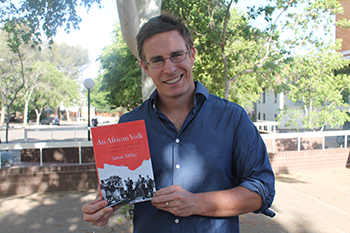Latest News Archive
Please select Category, Year, and then Month to display items
17 May 2024
|
Story Anthony Mthembu
|
Photo Supplied
 Prof Magdalena Sobon from Poland and Michael Jackson Blebo from Ghana shared their expertise with staff and students during their visit to the Department of Fine Arts at the University of the Free State.
Prof Magdalena Sobon from Poland and Michael Jackson Blebo from Ghana shared their expertise with staff and students during their visit to the Department of Fine Arts at the University of the Free State.
In a concerted effort to solidify its identity in South Africa and abroad, the Department of Fine Arts at the University of the Free State (UFS) recently played host to two distinguished artists: Prof Magdalena Sobon from the Wladyslaw Strzeminski Academy of Fine Arts in Lodz, and the Ghanaian multidisciplinary artist, Michael Jackson Blebo.
Dr Adelheid Von Maltitz, Senior Lecturer in the Department of Fine Arts at UFS, lauded the visits, held between 19 and 29 March 2024, as an enriching learning experience for the faculty and students within the department.
The visit highlights
During their visit to UFS, Prof Sobon and Blebo actively engaged with the department’s staff and students. Prof Sobon, an acknowledged paper-making artist, conducted a comprehensive two-day workshop, imparting extensive knowledge in this craft. As a direct outcome of this workshop, the department has procured the requisite equipment and materials, enriching the students’ capabilities in this medium. Blebo on the other hand, conducted a demonstration on clay bust modelling and both artists participated in critique sessions with the fourth-year students. Dr Von Maltitz underlined the significance of Blebo’s African heritage, noting, ‘’For our students to interact with a young, accomplished artist of his calibre is of benefit to them in terms of how they may envision their art careers.’’ Of particular note were Prof Sobon’s interactions with the students, wherein she shared her own artistic practices from her student years during her lectures.
In addition to their engagements with the students, Prof Sobon and Blebo also had the opportunity to present their research to second-year sculpture students at the Richmond Land Art Project, an off-campus initiative fostering art creation centred on socio-economic and other pertinent issues.
Future collaborations
Dr Von Maltitz emphasised the importance of maintaining ties with these eminent artists for the department’s growth and global outreach. Prof Sobon’s visit has paved the way for two department members to visit the Wladyslaw Strzeminski Academy of Fine Arts in Lodz in the near future. ‘’These individuals will get an opportunity to learn about studio setups and network with fellow academics, creative researchers, and artists,’’ stated Dr Von Maltitz. She hailed the visit by the two artists as both stimulating and fruitful, particularly for the students.
US author launches book at UFS on African volk
2016-10-17

Dr Jamie Miller, Postdoctoral Fellow at the
University of Pittsburgh and author of
An African Volk: The Apartheid Regime
and Its Search for Survival.
Photo: Rulanzen Martin
“I realised the importance of not just accessing the policies and political approaches of the leaders of the apartheid regime, but understanding the ideas and world views that informed them. Part of the solution to this was to learn Afrikaans.”
This is according to Dr Jamie Miller, a Postdoctoral Fellow at the University of Pittsburgh, on how he went about getting inside the mind of South Africa’s apartheid regime in order to complete his book, An African Volk: The Apartheid Regime and Its Search for Survival.
The book was launched on 11 October 2016 by the Archive for Contemporary Affairs at the University of the Free State on the Bloemfontein Campus.
Volk refers to the Afrikaner nationalist movement
The book is an ambitious new international history of 1970s apartheid South Africa. It is based on newly declassified documents and oral histories, the majority in Afrikaans, which focus on the regime’s attempts to turn the new political climate to its advantage.
The term volk refers to the Afrikaner nationalist movement, also known as Afrikanerdom. The story of Afrikaner nationalism was the medium through which the regime gained power.
Four main messages from the book
Dr Miller says there are four main messages for his readers. Firstly, the apartheid regime looked to contest and hijack new ideas and norms that formed the postcolonial world, and secondly, that we need to start thinking more seriously about the Cold War in terms of domestic politics, not just geopolitics.
Thirdly, South Africa should be integrated into histories of the global South, and lastly, we should conceptualise the apartheid regime by looking at it not just as an imperial holdover, but also by looking at what was happening in the world in the time period in question.